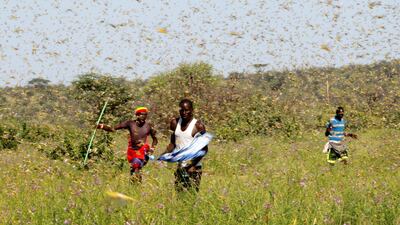The ongoing Covid-19 global pandemic has exposed our fragility on a number of levels from supply chains, healthcare, financial and everything in between. But past spillovers from other major epidemics (i.e Ebola and Sars) from wildlife to human beings also served as important reminders that when we destroy biodiversity, we're destroying the ecosystems that support human life.
Conserving and restoring biodiversity – the variety and variability of life on Earth, from ecosystems to species – is not only essential for sustainable development but for the fabric of life.
From the swarms of locusts threatening food security for millions across the Middle East, East Africa and South Asia, to the Covid-19 pandemic – the interrelationship between the environment, species, habitats, ecosystems and human health is clear.
Our societies are fundamentally interlinked with, and depend on, biodiversity. And biodiversity is not only essential for the provision of food, clean water and medicines but also against the protection of extreme weather events.
Before we reach an irreversible tipping point, now is the time to act.
Having said that, the onus shouldn’t only be on governments as businesses must also act to help offset biodiversity loss.
With the world calling for a greener recovery following the Covid-19 pandemic, businesses too must address environmental issues such as biodiversity.
A report published last year by the World Economic Forum highlighted that several economic gains are made when moving towards a "nature-positive economy".
The business case for investing in nature to offset biodiversity loss and put it at the top of the post pandemic agenda is also strong.
A case in point is Nestlé, which is using nature-based solutions to help restore ecosystems and preserve water resources. Throughout its supply chain, the company plants trees under its reforestation programme, which not only contributes to boosting biodiversity but also provides water and nutrients to the crops around them.
In using this technique, farmers therefore use less water, achieve greater crop yields and are more resilient to extreme weather events. This not only benefits the company's bottom line but has a wider environmental impact. Corporates in the region should take note of this approach given the rise in water insecurity in the region.
Another example is Unilever, which has implemented several programmes across Indonesia and Malaysia to help achieve UN Sustainable Development Goal 15 – life on land. The company is working to stop deforestation and help restore and expand forested areas to "prevent the worst impacts of climate change and safeguard the world's biodiversity" in the Malaysian state of Sabah. It has already lost half of its tropical forest mainly due to the industrial agriculture of oil palms.
Global financial institutions are also weighing up the idea.
Just as the Paris Agreement led to an international awareness and commitment to cut greenhouse gas emissions, the UN Convention on Biological Diversity, due to take place later this year, will likely lay the groundwork for similar efforts with a focus on biodiversity. A global call for businesses and financial institutions to also participate in these efforts will likely follow.
We've seen some evidence already last month when 37 financial firms signed up to the Finance for Biodiversity pledge, the first global financial industry effort of its kind. The signatories pledged to set targets and report on the impact their investments have on biodiversity.
Although biodiversity loss is inextricably linked with climate change, it’s a distinct environmental issue requiring specific solutions. The coronavirus could be a catalyst for key transformations needed in the region to better design climate solutions to deal with the looming biodiversity crisis.
Earlier this week at the One Planet Summit, world leaders convened over videoconference to discuss ways in which to better protect the world's biodiversity. And as governments renew their interests and commit to taking steps to offset biodiversity loss, they won't be able to deliver alone.
Biodiversity should also be a top environmental concern for businesses at the moment. Restoring and preserving nature can help tackle both the issue of biodiversity loss and climate change.
Further, addressing these issues simultaneously offers a number of benefits. In addition to improving water and food security, doing so would enhance resilience in the face of environmental, economic, health and social shocks. Over half of the world's GDP is moderately or highly dependent on nature so ignoring biodiversity could prove to be a risky business.
Maram Ahmed is a Senior Fellow at Soas, University of London.

